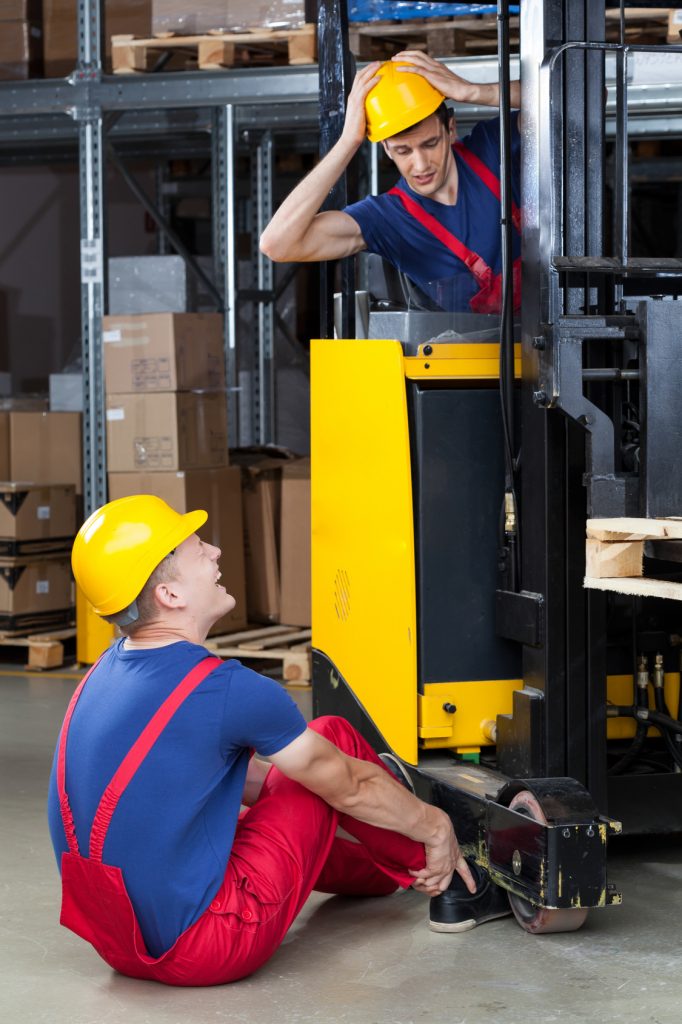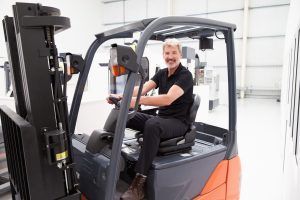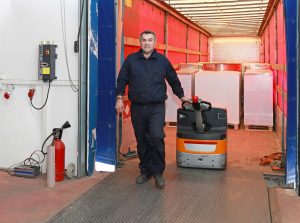Ultimate Guide to OSHA Forklift Certification Requirements
This OSHA forklift certification requirement guide is designed to help business owners, supervisors, managers, safety professionals, and forklift operators (new and current) by answering in detail the many questions we have received through the years. We hope this list of OSHA forklift certification requirements answers your questions. It is fair to say that this is not an exhaustive list so if you have additional questions please feel free to contact us and we will be more than happy to answer any questions you may have.
The Ultimate OSHA Forklift Certification Requirement Cheat Sheet
We developed this forklift training guide for business owners with the intent of answering the many questions regarding OSHA forklift certification requirements. There are a lot of very good forklift certification safety training companies in Wisconsin, Upper Michigan, and in the United States as a whole. Knowing what is required by the OSHA standard 29 CFR 1910.178 is extremely important when looking for a forklift training/certification class. Below is a list of topics designed to help you the business owner in choosing the best training program for your operators.
- History Adoption of Safety Standard for Powered Industrial Trucks (PIT)
- Mandatory Forklift Training
- Risks of Not Training Your Operators
- Forklift Re-certification
- Forklift Refresher Training
- Topics Recommended by OSHA – forklift training program
- Forklift Safety Video Alone Does Not Meet Requirements
- New Forklift Operator Training Requirements
- Refresher Forklift Training Requirements
- Operator Evaluation
- Six Training Services Offered
- Breakdown of Six Training Formats
- Research, Ask Questions, Talk to Others in Your Area
- Where to Go for Forklift Training
- Documentation to Have on File
- Wallet Cards
Brief History on the Adoption of Safety Standard for Powered Industrial Trucks
On May 29, 1971 (36 FR 10466), OSHA adopted many existing Federal standards and national consensus standards as OSHA standards under Section 6(a) of the Occupational Safety and Health Act (OSH Act) (29 U.S.C. 655 et al.). Section 6(a) permitted OSHA to adopt these standards without rule making for a period of two years after the effective date of the OSH Act. One of the consensus standards that was adopted under the Section 6(a) procedure was the American National Standards Institute (ANSI) B56.1-1969, Safety Standard for Powered Industrial Trucks. Among the provisions adopted from that consensus standard was the operator training requirement subsequently codified by OSHA at 29 CFR 1910.178(l). That requirement states: “Only trained and authorized operators shall be permitted to operate a powered industrial truck. Methods shall be devised to train operators in the safe operation of powered industrial trucks.” This excerpt was taken from OSHA’s website.First and Foremost! As a Business Owner it is Important to Realize –
Forklift Training is Mandatory
On December 1, 1998, the Occupational Safety and Health Administration (OSHA) published a standard that revised the existing requirements of 29 CFR 1910.178 and issued new requirements to improve the training of powered industrial truck operators. “These provisions mandate a training program that bases the amount and type of training required on:- The operator’s prior knowledge and skill
- The types of powered industrial trucks the operator will operate in the workplace
- The hazards present in the workplace; and the operator’s demonstrated ability to operate a powered industrial truck safely.
Forklift Refresher Training is Required When the Operator:
- Is involved in an accident or a near-miss incident
- Has been observed operating the vehicle in an unsafe manner
- Had been determined during an evaluation to need additional training
- There are changes in the workplace that could affect safe operation of the truck
- The operator is assigned to operate a different type of truck.

Know the Risks of Not Training Your Operators
By allowing inexperienced and untrained staff to operate forklifts at your place of business, you can open yourself up to a variety of risks (some of which include):- Increase compensation costs
- OSHA fines
- Legal actions
- Damage to your company’s reputation (local community and industry)
- Damage of raw materials, finished goods, material handling equipment, racking, and facility
- Injuries to forklift operators and pedestrians
- Loss of life
Bureau of Labor Statistics
Beginning with 2011, occupational injury data from the Bureau of Labor Statistics are based on the revised Occupational Injury and Illness Classification System (OIICS) 2.01 and are not comparable to the data for prior years in the tables below. Fatal occupational injuries in private industry with a forklift as the primary source of injury numbered 67 in 2012, a 1% increase from 2011. There were an additional 27 fatal occupational injuries with a forklift as the secondary source of injury in 2012, up 12% from 2011. Forklift fatalities are most prevalent in the trade, transportation, and utilities; manufacturing; and construction industries. The rate of nonfatal forklift injuries involving days away from work was 0.8 per 10,000 full-time workers in 2012, up from 0.7 in 2011. Natural resources and mining had the highest rate of nonfatal forklift injuries, followed by trade, transportation, and utilities and manufacturing The information in this section is from the NSC.IMPORTANT: OSHA does not provide forklift operator training. It is the employer’s responsibility to train the employees.
Know and Understand What OSHA’s Training Requirements Are
The standard found in OSHA’s CFR 1910.178(l)(2)(ii) states the following: Training shall consist of a combination of formal instruction (e.g., lecture, discussion, interactive computer learning, forklift training video, written material), practical training (demonstrations performed by the trainer and practical exercises performed by the trainee), and evaluation of the operator’s performance in the workplace.Below is a list of topics recommended by OSHA which should be included in the forklift training program:
Truck-related Topics 29 CFR 1910.178(l)(3)(i) sections 1910.178(l)(3)(i)(A) through 1910.178(l)(3)(i)(L)
- Operating instructions, warnings, and precautions for the types of truck the operator will be authorized to operate
- Differences between the truck and the automobile
- Truck controls and instrumentation: where they are located, what they do, and how they work
- Engine or motor operation

Be Sure to Include All Applicable Training Topics Recommended by OSHA - Steering and maneuvering
- Visibility (including restrictions due to loading)
- Fork and attachment adaptation, operation, and use limitations
- Vehicle capacity
- Vehicle stability
- Any vehicle inspection and maintenance that the operator will be required to perform
- Refueling and/or charging and recharging of batteries
- Operating limitations
- Any other operating instructions, warnings, or precautions listed in the operator’s manual for the types of vehicle that the employee is being trained to operate
Workplace-related Topics 29 CFR 1910.178(l)(3)(ii) sections 1910.178(l)(3)(ii)(A) through 1910.178(l)(3)(ii)(I)
- Surface conditions where the vehicle will be operated
- Composition of loads to be carried and load stability
- Load manipulation, stacking, and unstacking
- Pedestrian traffic in areas where the vehicle will be operated
- Narrow aisles and other restricted places where the vehicle will be operated
- Hazardous (classified) locations where the vehicle will be operated
- Ramps and other sloped surfaces that could affect the vehicle’s stability
- Closed environments and other areas where insufficient ventilation or poor vehicle maintenance could cause a buildup of carbon monoxide or diesel exhaust
- Other unique or potentially hazardous environmental conditions in the workplace that could affect safe operation
The Showing of a Forklift Safety Video Alone Does Not Meet the Full Requirements of 29 CFR 1910.178
The following excerpt is taken from OSHA’s website https://www.osha.gov/dte/library/pit/pit_q-a.html which may prove useful when deciding which training program would work best for your business; “One important thing to remember is that simply by showing employees a video or videos on some aspect of forklift safety does not meet the full requirements of the OSHA standard. Site specific information must be conveyed as well as a method to evaluate the employee’s acquired knowledge subsequent to the training.”Three Types of Training Requirement Explained
Breakdown of Training Requirements
1. New Operator Training: The standard provides a list of training topics; however, the employer may exclude those topics which are not relevant to safe operation at the employee’s work location. Section 178(l)(3)(i) (a list of topics provided in the article below) contains truck related topics to include in your training and section 1910.178(l)(3)(ii) (a list of topics provided in the article below) contains information regarding dealing with workplace-related topics.
2. Refresher Training: Forklift refresher training requirements must be met to ensure that the operator has the knowledge and skills needed to operate the powered industrial truck safely. Refresher training in relevant topics shall be provided to the operator when he/she has been:
- Observed to operate the vehicle in an unsafe manner
- Involved in an accident or near-miss incident
- Has received an evaluation that reveals that the operator is not operating the truck safely
- Assigned to drive a different type of truck
- A condition in the workplace changes in a manner that could affect safe operation of the truck (29 CFR 1910.178(l)(4))
3. Operator Evaluation: If an operator does not fall under any of the criteria contained under the Refresher Training section above and it has been over three years since their last training/evaluation, then the operator’s performance must be evaluated at least once every three years. It is recommended that a copy of the new hands-on evaluation form be added to the previous forklift operator training documentation. As mentioned in previous sections the following information should be included: the name of the operator, the name of person performing the evaluation and the date of the hands-on evaluation.

Six Common Training Services Offered
1. Off-site training – classroom and hands-on evaluation – at their place of business
2. On-site training – classroom and hands-on evaluation – at your place of business
3. A combination of the two – classroom hosted at their place of business (off-site) and then they come to your place of business for hands-on evaluation (on-site)
4. Online forklift certification – many times it will be your company’s responsibility to do the hands-on evaluation portion
5. Free forklift training or free online forklift certification
6. Train-the-Trainer forklift operator safety training
Some Considerations When Choosing Each of the Six Training Formats
Off-site Forklift Certification
A couple of reasons why a business may choose to have their training at the trainers’ location is if there is a lack of open space at their place of business. Another reason may be a high amount of forklift traffic. Thus having all the training off-site might alleviate a safety concern of holding an on-site training in either a highly traveled production area and/or in the vicinity of pedestrians. However, having it at an off-site location (i.e. fork truck training school) may not meet the last of the 3 requirements OSHA states in section [29 CFR 1910.178(l)(2)(ii)] which I have highlighted below: “Training shall consist of a combination of formal instruction (e.g., lecture, discussion, interactive computer learning, video tape, written material), practical training (demonstrations performed by the trainer and practical exercises performed by the trainee), and evaluation of the operator’s performance in the workplace.” In order to fulfill the OSHA forklift training requirements someone from the company leading the training would need to come to your location or you or a member or your staff would need to provide the hands-on evaluation portion for the forklift training. A separate hands-on evaluation is required for each operator, for each different class of equipment, and any attachments. Four possible areas of concern business owners may have when considering off-site forklift training classes: 1) The operators may not be evaluated on a similarly equipped class of lift truck (i.e. make, model, attachment(s) may be different). 2) Travel to an off-site location would require coordination of travel. 3) Lack of productivity during time behind the wheel both ways, 4) Worker’s pay for the time away while they are driving to and from training locations.On-site Forklift Certification
Having the classroom portion and the hands-on evaluation held on-site at your location has the benefits of not having to deal with travel time as the workers would likely show up for their normal shift, so no coordination of travel would be necessary. Worker’s paid time away while they are driving to and from training locations would not be a concern as in the previous example. Transition from the end of the training to the time that the worker gets back to their work station is usually minimal. There may be some disruption in production having it onsite during normal business hours i.e. only one forklift and would not be available during the hands-on portion of training. However, forklift operator training could be scheduled to occur during down time, off-season (low demand), or during a scheduled maintenance/retooling period.Combination of Off-site and On-Site Forklift Certification
Choosing to go with a company that offers a combination of the two (both off-site and on-site training) might be beneficial i.e. if your place of business does not have a place to hold the classroom portion. However, you would still have similar expenses as in the first example: 1) Travel to an off-site location would require coordination of travel. 2) Lack of productivity during time behind the wheel both ways, 3) Worker’s pay for the time away while they are driving to and from training locations. Again, in order to fulfill the OSHA forklift training requirements someone from the company leading the training would need to come to your location or you or a member or your staff would need to provide the hands-on evaluation portion for the forklift training. A separate hands-on evaluation is required for each operator, for each different class of equipment, and any attachments.
Online Forklift Certification
Online forklift certification is yet another training format that may work well for businesses. There are a number of online companies offering forklift operator training. One of the most common selling points cited is the convenience they offer. Most forklift certification training companies ask the business owner to enter their business information, the names of those attending, the type(s) of equipment their employees will use, and then some form of payment (usually credit card). The operators are told where to log in and then proceed through the training process. Many are timed but the operators are allowed to go back review questions and answers to make necessary corrections. In the end most operators will achieve a perfect score and/or passing grade. Some additional selling points of going with online forklift certification include: Instant printable certificate of achievement and wallet card (commonly referred to as a forklift license). Most will also mail original copies after successful completion of the forklift class. NOTE: In order to meet the OSHA forklift training requirements, you or someone from your company would need to complete the hands-on evaluation portion. There would need to be a separate hands-on evaluation for each operator, for each different class of equipment, and any attachments.Free Online Forklift Certification
Free online forklift certification training is the fifth and final training format mentioned above. These websites/businesses appear to be primarily focused to those workers looking for forklift jobs but do not have any experience. While they do not offer hands-on evaluations they do provide a vehicle for those new to the industry an opportunity to learn more about characteristics, fundamentals and the operation of a forklift.Train-the-Trainer Forklift Operator Safety Training
Attending a train-the-trainer forklift operator training class may be a good option for those companies that for example, have a large number of operators. It is also handy to for those companies that run multiple shifts or have a high turnover. There is the initial upfront cost of the class but the cost savings could be easily realized in a very short time. One important caveat to those attending a train-the-trainer class, the class in itself does not normally include operator training. That is to say, the train-the-trainer class does not replace the forklift operator safety training class.Research, Ask Questions, If Possible Talk to Others in Your Area – Don’t Skip This Step
If you are currently in the market to find a business to train your forklift operators you will quickly learn that all training companies are not the same. Before enlisting the help of a forklift operator training company and enrolling your team in a forklift training course, take some time and do some research. To ensure you are getting what you require from the forklift course, think about performing a little research on the company(s) you are considering.Some items to inquire:
- Cost for example, is their price in line with others you have contacted
- What is their experience in training those in your industry
- Ask whether the trainer is certified and if so by whom
- What are the minimum/maximum class size
- What content covered
- Are they aware of the forklift certification requirements
- What is the average length of class
- What documentation is provided upon successful completion
Where to Go for Training
- Truck manufacturers
- Local safety and health safety organizations i.e. National Safety Council local chapters
- Private consultants with expertise in powered industrial trucks
- Local trade schools
- Vocational schools
Be Sure to Confirm That You Will Receive the Required OSHA Documentation to Put on File

Many companies will provide you the following for each employee:
- Sign in sheet (original)
- Forklift training test (original)
- Hands-on evaluation worksheet (original)
- Certificate of achievement
- Wallet card (commonly referred to as a forklift license)

Thanks for your comment about how a forklift is trained based on their background knowledge in the filed. I like how you said that they should be able to work an industrial truck in a safe manner. My brother is considering forklift training so that he can become certified to work in this field.
I like that you listed a bunch of places to go for forklift training since they are serious pieces of equipment that should be used by trained officials. My brother would like to look at this list. He is currently thinking of getting this training and would like the help.
Hello! Thanks for this content. This will be certainly helpful.